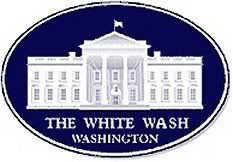
McClellan Stonewalls on Domestic Spying
 Boy, does White House Press Secretary Scott “The Lyin’ King” McClellan hate it when the press won’t take “blah, blah, blah” for an answer. Here’s a reporter at the daily press briefing yesterday trying to get a straight answer out of McClellan about why Bush can’t comply with the law like every president before him:
Boy, does White House Press Secretary Scott “The Lyin’ King” McClellan hate it when the press won’t take “blah, blah, blah” for an answer. Here’s a reporter at the daily press briefing yesterday trying to get a straight answer out of McClellan about why Bush can’t comply with the law like every president before him:Q: I have two questions that can be dismissed with a yes or no. One, is the President going to seek any legal -- more legal permission from Congress to spy on Americans without a warrant? And two, does he think, does he believe that his new designation of the spy program, terrorist surveillance, will tarnish people who are spied on and are guilty or not guilty?
McClellan: Let me take the first part of your question, and I think it's important to give a clearer picture of where things are with the American people, and so I want to make a few comments about it.
Q: I want to know where you stand --
McClellan: And I'm going to do that. I've already previously answered this question with reporters and stated our view; the Attorney General stated it earlier today in some interviews. This is an important tool that helps to save lives by preventing attacks. It is a limited, targeted program aimed at al Qaeda communications, as the President pointed out yesterday. This program is focused only on communications in which one person is reasonably suspected of links to al Qaeda or affiliated terrorist organizations. And it involves international communications.
I reject your characterization to suggest it's domestic spying. That's like saying someone making a phone call from inside the United States to another country is a domestic call. It is billed the international rate and it is labeled --
Q: The law says he has to seek a court warrant.
McClellan: -- it is labeled an international call --
Q: Why doesn't he seek a warrant? What's the big problem?
McClellan: Well, actually, we've walked through this repeatedly over the last few days. It's important for the American people to understand what the facts are. There is a lot of misinformation about --
Q: Why can't you seek a warrant?
McClellan: -- this program. And we do use the FISA tool, as well. That's an important tool, as well. But we have briefed members of Congress more than a dozen times on this. We continue to brief members of Congress in an appropriate manner. This is a highly classified program and it is a vital program to our nation's security. The 9/11 Commission criticized us for not connecting the dots --
Q: Is it vital to go through legal steps?
McClellan: This is helping us to connect the dots in a very targeted and focused way.
Q: Why can't he seek a warrant?
McClellan: It is about detecting and preventing attacks. FISA was created for a different time period. General Hayden walked through that yesterday; the Attorney General talked about it more. This is about moving with speed and agility, not some long-term period of time. It's about detecting --
Q: You can get one retroactively.
McClellan: -- it's about detecting and preventing attacks. And we are a nation at war, and the courts have upheld the President's authority to engage in surveillance. Surveillance is critical to prevailing in the war on terrorism.
Q: He doesn't have a blank check.
McClellan: And we talked with members of Congress about whether or not there needed to be legislation that reflects what the President's authority already is, and the congressional leaders felt that by doing so it could compromise this program. This is a vital program and it's important that we don't show the enemy our play book. And talking about it --
Q: Getting warrants doesn't show the enemy a play book.
McClellan: Okay. Next question.
Now that’s how a responsible press secretary behaves. “If you’re not going to accept my non-answer, I’m just going to have to move on!”
 Boy, does White House Press Secretary Scott “The Lyin’ King” McClellan hate it when the press won’t take “blah, blah, blah” for an answer. Here’s a reporter at the daily press briefing yesterday trying to get a straight answer out of McClellan about why Bush can’t comply with the law like every president before him:
Boy, does White House Press Secretary Scott “The Lyin’ King” McClellan hate it when the press won’t take “blah, blah, blah” for an answer. Here’s a reporter at the daily press briefing yesterday trying to get a straight answer out of McClellan about why Bush can’t comply with the law like every president before him:
















<< Home